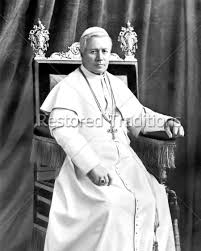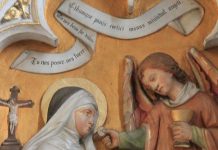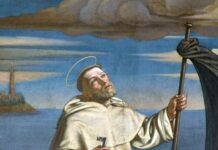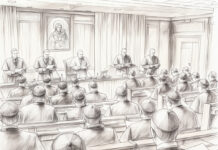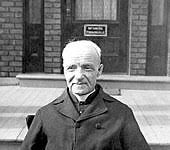Saint Pius X (+1914), born Guiseppe Sarto, was a peasant, he was the first such in centuries, the custom being that popes were chosen from the ‘nobility’ – it is a true rags to riches story, even if he rejected all the potential riches. He brought his simple ways into the papal office, rescinding the custom, amongst others, of Popes eating alone, established by Urban VIII in the early 17th century – yes, the same one who condemned Galileo, but also sent the Jesuit missionaries to the New World. Perhaps if the touchy and vain Urban had broken bread and a swilled a fine bottle of Chianti with the irascible scientist, history would have been a whole lot different.
From childhood, he was formed in hard work and discipline, which he brought into his priesthood, his episcopacy as bishop of Mantua, and eventually the papacy, elected on August 4th in the conclave of 1903 after the death of Leo XIII July 20th – large shoes to fill, taking the name Pius.
For all that he stood his ground unflinchingly for orthodoxy, with no toleration for heretics or liturgical innovators, Pope Pius was known for his holiness, patience, kindness, which shines forth even in old photographs, in which his eyes seem still to pierce one’s soul – what must he have been like as a confessor? There were even reports of miracles performed through his intercession.
Instaurare omnia in Christo was Pius’ chosen motto – to restore all things in Christ – one to which he lived up admirably, reforming the Church from the inside out: Soon after being elected he penned Tra le Sollecitudini, (Nov. 22, 1903), reinstating Gregorian chant and polyphony and the solemn splendour of liturgy and the Mass. Against the dour rigorism of Jansenism, he promoted daily reception of Holy Communion – nearly unheard of – and clarified the simple requirements to receive – at the age of reason, and being free from mortal sin, that the Bread of Life is medicine for sin and supernatural sustenance for eternal life, and not a reward for being virtuous.
He began the monumental task of summarizing and codifying canon law, and reformed the breviary and seminary instruction. And he penned numerous encyclicals on a variety of topics. He is perhaps best remembered for his attempt to root our ‘modernism’, which he described in Pascendi Dominici Gregis (Sept 8th, 1907) as the ‘synthesis of all heresies’, an insidious, agnostic doctrine, undermining the very basis of the Faith – still with us in various forms – all the while masking as rational, and even, ironically, pious. Beware of those who do evil under the cloak of good.
It is said the holy Pontiff died of a broken heart on August 20th, when he heard of the outbreak of World War I, for, in a mystical way, he perhaps foresaw what human and societal carnage it would wreak.
A century on, may Pope Pius intercede for us in our own fractious times, keeping the barque of Peter not just afloat, but well on course towards the eschaton. He knew that the Pope was not Christ, only His vicar. And if the omnipotent God is in charge of the Church, even though she be tossed like the Apostles in that first storm-tossed boat, why should we be afraid? With one word the wind and the sea obey Him.

